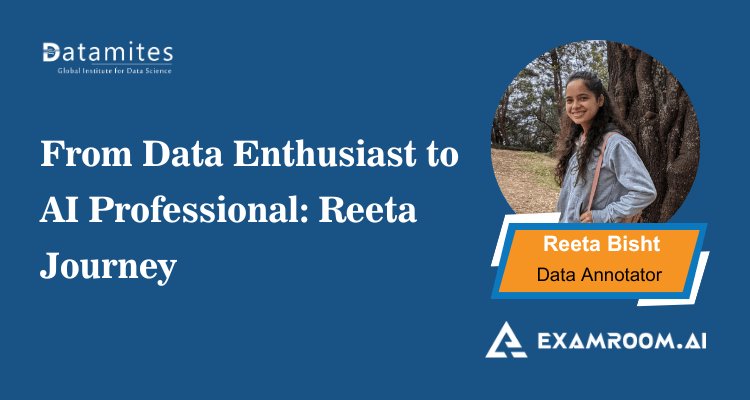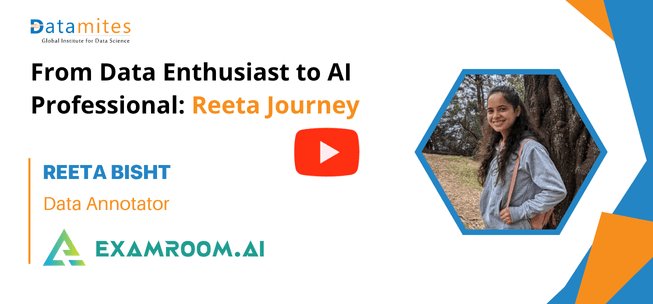Reeta’s Inspiring Journey to Becoming a Data Annotator
Reeta’s journey to becoming a Data Annotator is a powerful example of resilience, adaptability, and growth. Her story serves as an inspiration for anyone looking to start a tech career without a traditional tech background.

From preparing for government exams to securing a role in the fast-paced world of artificial intelligence, Reeta’s story is one of resilience, transformation, and continuous learning. With no prior programming experience and a strong foundation in mathematics, she dared to step into the world of data science armed with curiosity and determination. In this blog, we dive deep into how Reeta broke barriers, overcame coding fears, and carved her niche as a successful Data Annotator at Exam Room AI. Whether you’re a fresher, a career switcher, or someone doubting your potential, her journey is the motivation you didn’t know you needed.
Inside the Life of a Data Annotator: A Q&A with Reeta
In this candid Q&A, Reeta shares her real-world experiences, challenges, and the skills that keep her thriving in the AI industry.
Q1: Can you briefly introduce yourself and share your educational background?
Sure! I completed my graduation in PCM (Physics, Chemistry, Mathematics) from my hometown in Uttarakhand and then pursued a master’s in Mathematics from Jaipur. Afterward, I started preparing for government exams but later decided to explore opportunities in the IT sector. That’s when I discovered DataMites and joined their basic Data Science course.
Q2: What made you choose DataMites for your data science training?
I came across DataMites through my research and was very satisfied with their curriculum, faculty, and support. The structure was very beginner-friendly, and it gave me confidence to start a career in data science despite being from a non-programming background.
Q3: How did you transition from not having any coding experience to working in data science?
Initially, it was quite tough. Python and SQL were completely new to me. But the teaching at DataMites, especially from mentors, made the learning process manageable. I practiced regularly and consistently improved by dedicating 2 to 3 hours daily.
Q4: What specific areas did you focus on during your learning phase?
I focused heavily on the basics NumPy, Pandas, and data structures. These foundational topics were essential not just during training but also during job interviews and real-world projects. Practicing these helped me land the role and now helps me daily at work.
Q5: What kind of projects did you work on during the course?
During the internship with DataMites, I worked on five different live projects covering key areas like machine learning and deep learning. I strategically chose projects that involved supervised and unsupervised learning to get broad exposure.
Q6: How helpful were these projects in your current job?
Very helpful! The mindset I developed while working on those projects still helps me approach real-time tasks logically. Although I’m not building projects from scratch now, I often work on optimizing existing ones.
Q7: How do you manage your daily work and learning schedule?
Yes, I usually plan my day ahead by noting down tasks and dividing my workload. Although sometimes high-priority tasks may require working extra hours, most days are manageable. The work culture here allows enough time for continuous learning and skill updates.
Q8: Are you using SQL in your current role?
No, not currently. In my team, we primarily use Python. However, our Data Engineering team works extensively with SQL. If you plan to move into data engineering, you’ll definitely need to learn SQL.
Q9: Did you ever doubt your path during the initial months of joining?
Absolutely. For the first 6–7 months, I had doubts about continuing, especially since I started with a basic role. But I remained patient, kept learning, and eventually started contributing to more meaningful work. Over time, the satisfaction came.
Q10: Is data annotation a good starting point for data science careers?
Yes, absolutely. It’s a stepping stone. While the role may not require advanced skills initially, many companies do prefer basic knowledge of Python and logical thinking to consider future transitions into AI/ML roles.
Q11: How long did it take you to get your first job after completing the course?
I completed my course around March or April. After attending mock interviews conducted by DataMites, I got placed within 2–3 months. The mock interviews helped me a lot by building confidence and preparing me for real interviews.
Q12: What kind of placement support did you receive from the DataMites team?
The support was consistent. I received regular emails with job openings, mock interviews, and guidance. They provided everything a fresher needs opportunities, mentoring, and feedback. After that, it’s up to the student to give their best.
Q13: What advice would you give to others coming from non-programming backgrounds?
Don’t be afraid to start! Focus on practicing daily, especially Python, SQL, and libraries like NumPy and Pandas. Choose a good course that offers hands-on projects. Consistent learning and patience are key.
Refer these below articles:
- Innovation Through Intelligence: Rahul’s AI Career Unfolded
- AI Engineer Bhavya Ranjan Shares His Generative AI Journey
- Saif Ali Khan’s Journey: From Economics Graduate to ML Engineer
Key Findings from Reeta's Data Science Journey
Here are the key insights from her experience, highlighting the challenges she overcame and the strategies that led to her success.
- Academic Background: Reeta holds a graduation degree in PCM and a master’s in Mathematics.
- Career Shift Motivation: Initially prepared for government exams but later transitioned to IT, discovering DataMites as a gateway into data science.
- Choosing DataMites: Selected DataMites for its beginner-friendly curriculum, supportive faculty, and practical training approach.
- Transitioning Without Coding Experience: Faced initial challenges with Python and SQL but overcame them through daily practice and mentorship.
- Focused Learning Areas: Concentrated on foundational concepts like NumPy, Pandas, and data structures, which proved valuable in interviews and job tasks.
Read these below articles:
- Is Artificial Intelligence Still in High Demand in Kohima?
- Exploring the Demand for Artificial Intelligence in Itanagar
- Exploring Artificial Intelligence Demand in Gangtok
Reeta’s journey is a powerful example of how determination, structured learning, and daily practice can help anyone break into the tech field, regardless of their background. If you're looking to upskill, joining a comprehensive artificial intelligence course in coimbatore could be your stepping stone.
According to Grand View Research, the global artificial intelligence market was valued at USD 279.2 billion in 2024 and is projected to reach USD 1.81 trillion by 2030, with a CAGR of 35.9% from 2025 to 2030. An Artificial Intelligence course in Ahmedabad provides strong academic and industry-focused training options, including degree programs and practical certification courses.
DataMites has established itself as a leading provider of AI training in India, earning recognition from Analytics India Magazine alongside esteemed institutions such as IITs and IIMs. Learners of the program receive internationally acknowledged certifications from IABAC and NASSCOM FutureSkills, enhancing their professional credibility and opening doors to promising career opportunities in the AI job market.

